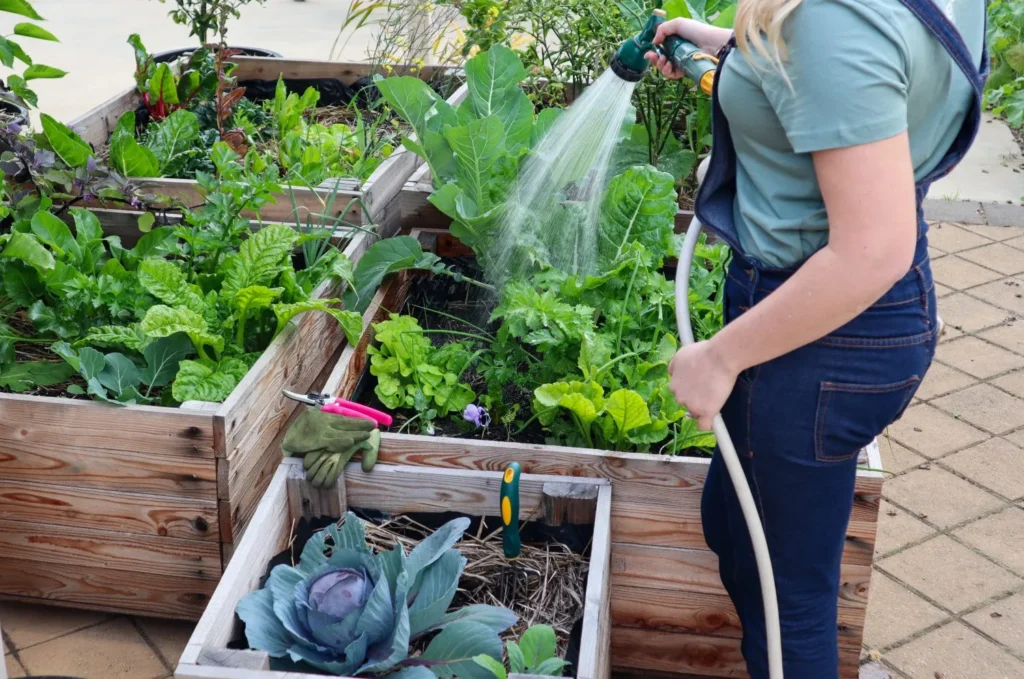When a heatwave hits, it can feel like the sun is on a mission to test the limits of your garden. High temperatures can make gardening more challenging, but with the right techniques, you can maintain a healthy garden in the heatwave. Understanding how to care for your plants during these extreme conditions is key to ensuring they stay vibrant and productive. Let’s explore some simple and effective ways to protect your garden from the sweltering heat.
Water Wisely: The Key to a Thriving Garden
One of the most important things to do for your garden during a heatwave is to manage watering properly. Plants need extra water when it’s hot, but you also want to be smart about how you use it. Early morning is the best time to water your garden. This is because the water will have time to soak into the soil before the sun gets too hot and evaporates it. Try to water the soil around the base of the plants rather than water from above. This helps avoid wetting the leaves, which can lead to diseases.
Mulching: A Simple Way to Keep Soil Cool
Mulch is like a blanket for your garden’s soil. It helps keep the soil cool and moist, even when it’s hot outside. You can use different types of mulch, such as straw, wood chips, or even leaves. Spread a layer of mulch around your plants to help the soil retain water and stay cool. This also prevents weeds from growing, which can compete with your plants for water and nutrients.
Shade Solutions: Protecting Your Plants from Direct Sunlight
Plants can get sunburned just like people do. During a heatwave, it’s a good idea to provide some shade for your garden. You can use shade cloths or create a makeshift shade with old sheets or garden fabric. Another option is to plant taller plants or use garden structures to cast shadows on more delicate plants. Shade helps reduce the amount of direct sunlight that reaches your plants, which can protect them from overheating.
Soil Health: Keeping Your Garden’s Foundation Strong
Healthy soil is crucial for a healthy garden, especially during a heatwave. Good soil retains moisture better and provides essential nutrients for your plants. To keep your soil in top shape, you might want to add compost or organic matter. This not only improves the soil structure but also helps it hold onto water. Test your soil regularly to check its moisture levels and adjust your watering practices accordingly.
Proper Planting Techniques: Ensuring Resilience
When planting new plants or maintaining existing ones during a heatwave, proper techniques can make a big difference. Make sure to plant your garden in a spot that gets some afternoon shade if possible. If you’re planting new seeds or seedlings, consider starting them in pots or containers where they can be more easily moved to a shaded area. Planting in well-drained soil and spacing your plants properly helps ensure they get enough air circulation and reduce the risk of disease.
Drought-Tolerant Plants: Choosing the Right Varieties
Some plants are naturally better at handling hot, dry conditions than others. Choosing drought-tolerant plants can help your garden thrive even when the weather is extreme. Plants like lavender, succulents, and certain grasses are known for their resilience in hot climates. Research which plants are best suited for your region and consider incorporating them into your garden. These plants typically need less water and can withstand higher temperatures.
Fertilizing Smartly: Avoiding Overuse
During a heatwave, it’s important to be cautious with fertilizing. Too much fertilizer can stress your plants, especially when they are already struggling with the heat. Instead of using large amounts of fertilizer, opt for a slow-release variety that provides nutrients over a longer period. This helps ensure your plants get what they need without overwhelming them. Also, avoid fertilizing during the hottest part of the day to prevent additional stress.
Pest and Disease Management: Keeping Problems at Bay
Heatwaves can sometimes lead to an increase in pests and diseases. Warmer temperatures can create a more favorable environment for pests like aphids or spider mites. Regularly inspect your plants for any signs of trouble. If you notice pests or diseases, act quickly to address the issue. Use natural pest control methods like introducing beneficial insects or using organic sprays. Keeping your plants healthy through proper watering and mulching also helps them resist diseases better.
Garden Maintenance: Regular Care Makes a Difference
Maintaining a garden during a heatwave requires consistent care. Check your garden daily to ensure that the plants are not showing signs of stress. Prune any dead or damaged parts of the plants to help them focus their energy on healthy growth. Keep an eye on the soil moisture and adjust your watering schedule as needed. Regular maintenance helps your garden stay in good shape and can make it easier to spot and address any problems that arise.
Hydration for You: Staying Cool While Gardening
Don’t forget to take care of yourself while tending to your garden. Heatwaves can be tough on humans as well as plants. Stay hydrated by drinking plenty of water and taking breaks in the shade to cool down. Wear a hat, sunscreen, and lightweight clothing to protect yourself from the sun. Gardening can be enjoyable, but it’s important to prioritize your well-being to keep up with garden care effectively.
Conclusion: Thriving Through the Heat
Maintaining a healthy garden in the heatwave is a challenge, but with the right strategies, you can keep your garden thriving despite the extreme temperatures. From smart watering practices and mulching to choosing the right plants and providing shade, these tips can help you ensure your garden remains vibrant and productive. Remember to keep an eye on both your plants and yourself to make the most of this gardening season. Happy gardening!



